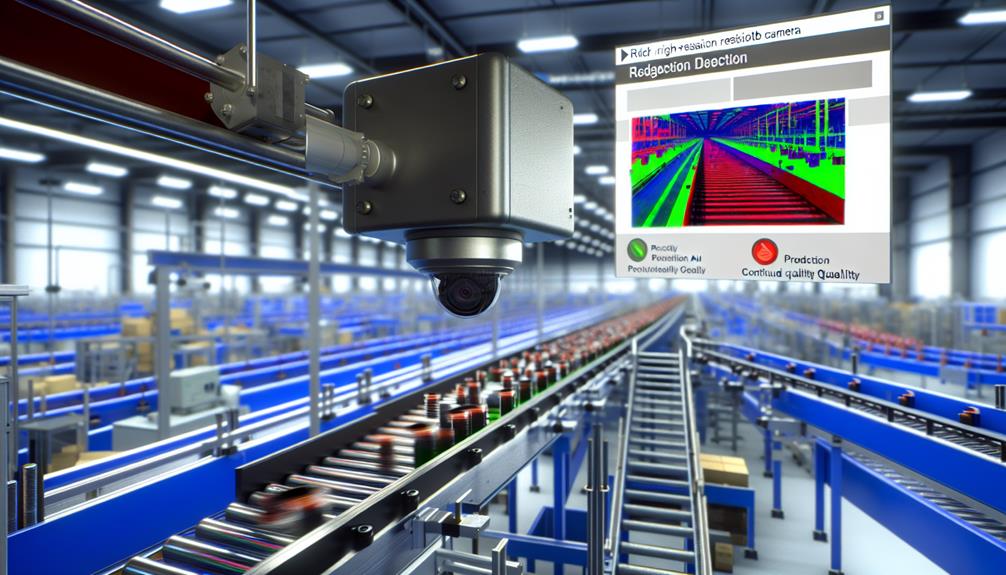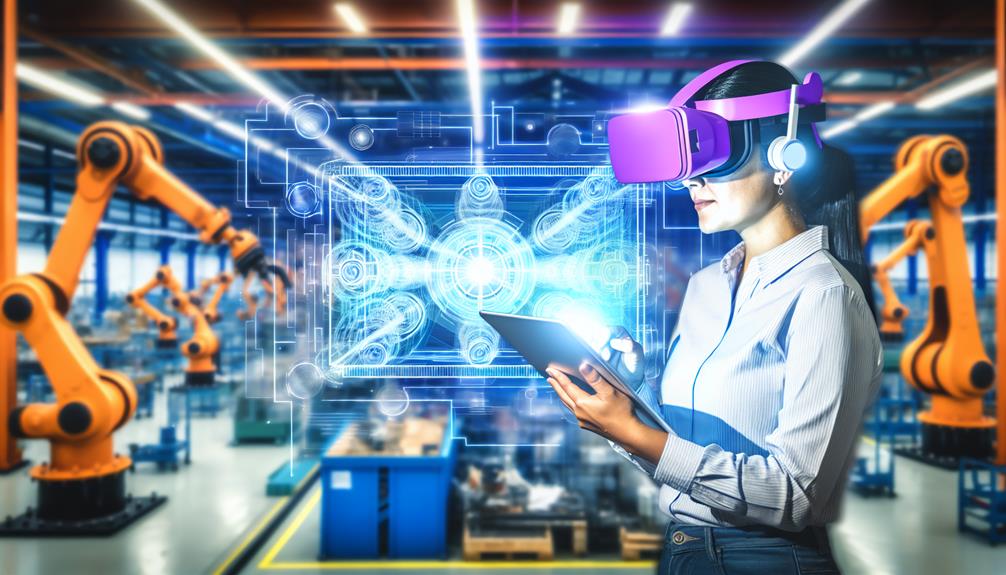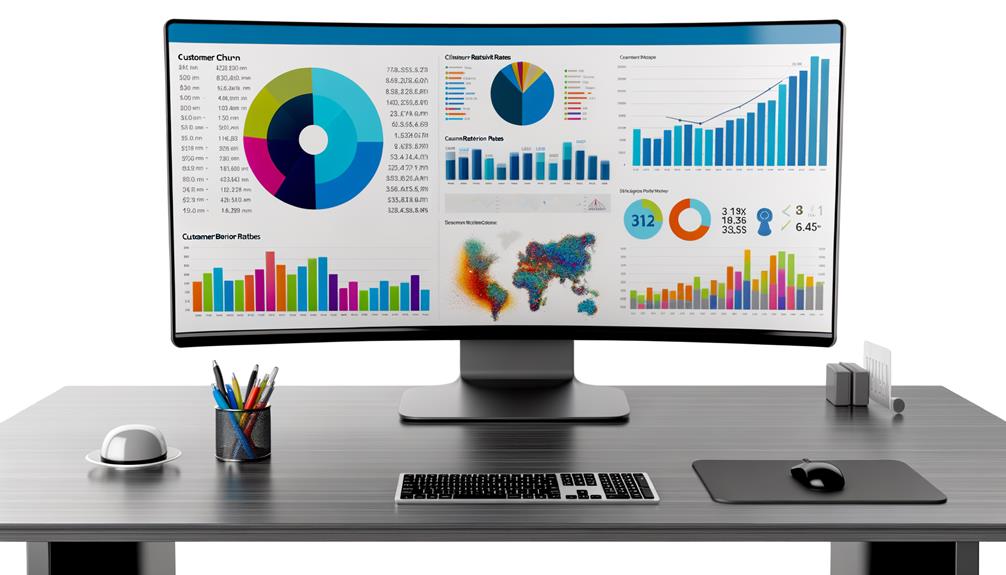To achieve best manufacturing efficiency, implementing AI-driven insights is essential. AI enhances predictive maintenance by analyzing real-time data to predict and prevent equipment failures, reducing downtime by up to 30%. It also transforms supply chain operations through advanced data analysis for demand forecasting and logistics optimization, leading to significant efficiency gains. AI-driven insights boost productivity by 15%, optimize resource allocation, and enhance quality control through defect detection. Further, AI algorithms inform data-driven decision-making, optimize energy consumption, and streamline production processes. Integrating AI fosters innovation, competitiveness, and future-proofing in the manufacturing industry. As organizations invest in AI, they will continue to reveal new opportunities and improvements.
Key Takeaways
- AI-driven insights enhance predictive maintenance, reducing downtime by up to 30% and ensuring proactive equipment strategies.
- Advanced data analysis optimizes supply chain operations, forecasting demand and logistics to enhance visibility and efficiency.
- Data-driven decision-making using AI algorithms informs timely and effective business choices, optimizing production processes and resource allocation.
- AI visual inspection systems detect anomalies for high-quality products, reducing errors and waste through real-time defect detection.
- AI-driven process optimizations identify and eliminate production inefficiencies, resulting in cost savings and operational efficiency gains.
Enhancing Predictive Maintenance
AI-driven predictive maintenance in manufacturing leverages advanced algorithms and real-time data analysis to reduce downtime by up to 30%, ensuring proactive maintenance strategies for optimum equipment performance and reliability.
This cutting-edge approach analyzes equipment data to predict maintenance needs, preventing costly breakdowns that can notably impact production.
Transforming Supply Chain Operations
AI-Driven Insights for Best Manufacturing Efficiency
Transforming Supply Chain Operations
What role does advanced data analysis play in optimizing supply chain operations and enhancing overall efficiency in manufacturing? As manufacturers confront the challenges of demand forecasting, inventory management, and logistics optimization, AI-driven insights play a crucial role. By integrating AI algorithms that can analyze vast amounts of data, manufacturing operations can experience significant efficiency gains.
Predictive maintenance to quality control, AI algorithms analyze data to optimize inventory levels, improve supply chain visibility, and streamline logistics planning. These gains contribute to transforming the manufacturing industry, as AI technologies reveal hidden insights and adapt to real-time changes.
Effective integration of AI in manufacturing supplies actionable data, enhancing operational agility and reducing costs. Best supply chain systems leverage AI to uncover efficiency improvements, ensuring timely responses to market demands. By harnessing the power of AI, manufacturers can access the full potential of their supply chains and gain a competitive advantage.
Boosting Efficiency and Productivity

SMA Solar Technology AG has successfully integrated AI-driven insights into its manufacturing process. This integration resulted in a 15% increase in supply chain workforce efficiency and significant reductions in inventory carrying costs and planning expenses.
These improvements were achieved through the implementation of AI-centric solutions that optimize decision-making and streamline product development. By leveraging real-time data, SMA Solar Technology AG has enhanced its overall manufacturing efficiency, product quality, and customer satisfaction.
Efficient Operations
Enhanced by advanced data analytics, manufacturing processes are experiencing significant productivity boosts, exemplified by SMA Solar Technology AG's 15% increase in supply chain workforce productivity. This improvement stems from efficient inventory management and reduced planning costs, two critical areas where AI-driven insights have made a substantial impact.
By leveraging accurate predictive insights, manufacturing operations can optimize process adjustments to achieve best outcomes. This holistic approach not only reduces waste but also guarantees product quality while enhancing profitability.
Additionally, AI-driven visual inspections have proven to be instrumental in enhancing quality control, allowing for swift detection and resolution of potential issues.
The integration of AI into manufacturing operations has enabled companies to adapt to dynamic market demands, ensuring continuity even in the face of disruptions. As AI technology continues to evolve, its potential to elevate manufacturing efficiency will only grow.
Innovation Harnessing Data
The strategic integration of AI utilizes data as a transformative resource to unleash unprecedented efficiency and productivity in manufacturing. By leveraging AI-driven insights, manufacturers can harness data to optimize operations and streamline processes. This level of data-driven innovation results in significant improvements across the production spectrum.
For instance, AI-driven insights can boost efficiency by up to 25% and reduce equipment downtime by 30%, allowing for smoother and more cost-effective operations. Additionally, AI integration enhances workforce productivity by 15%, ensuring that human capital is optimized to focus on high-value tasks.
Precise inventory management with AI also leads to reduced planning costs, further solidifying the importance of data-driven decision-making.
One of the most significant benefits of AI-driven insights is its impact on quality control systems. By improving defect detection accuracy by 90%, manufacturers can confidently guarantee the quality and reliability of their products. As industries continue to adopt AI, harnessing data becomes key to driving efficiency and productivity, fostering a culture of innovation in manufacturing….
Data-Driven Decision Making
Manufacturers can revolutionize their operations by integrating data-driven decision making, where AI algorithms analyze vast amounts of data, identifying patterns, trends, and anomalies to inform timely and effective business choices. This approach allows for real-time monitoring and analysis of production processes, enabling quick and informed decision-making. By leveraging machine learning algorithms, manufacturers can predict maintenance needs, optimize resource allocation, and improve overall efficiency.
Integrating AI into data-driven decision making has a profound impact on manufacturing operations. AI-powered quality control systems can inspect products for defects, ensuring quality and consistency. Predictive maintenance, enabled by AI, reduces downtime and prevents costly repairs. The integration of AI also optimizes production processes, analyzes vast amounts of data, and enhances efficiency and productivity.
The impact of AI in the manufacturing sector is significant, as it improves product quality and drives innovation. By investing in data-driven decision making, manufacturers can discover new opportunities for growth and competitiveness in the modern digital landscape.
AI-Driven Quality Control

By leveraging AI technology, manufacturers can greatly enhance defect detection accuracy, analyzing vast amounts of data in real-time to guarantee high-quality products are produced consistently and efficiently.
AI-driven visual inspection systems can detect even the smallest anomalies that may evade human inspection, leading to substantial decreases in waste and production downtime.
AI-Enhanced Defect Detection
Artificial Intelligence-powered quality control systems, fortified with machine learning capabilities and advanced computer vision technology, demonstrate a remarkable 90% enhancement in defect detection accuracy. This accuracy is essential for guaranteeing products meet strict quality and regulatory requirements.
By analyzing production data, machine learning algorithms identify patterns and anomalies, improving product quality assurance. AI-driven visual inspection systems reduce manual oversight, guaranteeing consistent product quality in manufacturing processes.
Advanced computer vision technology integrated with AI enables real-time defect detection, minimizing errors and waste. AI-powered quality control solutions lead to significant cost savings by reducing rework and improving overall product quality.
Real-time monitoring and intervention capabilities allow defects to be addressed as they occur, further enhancing efficiency. By leveraging AI in quality control, manufacturers can optimize their processes, reduce downtime, and ensure high-quality products reach the market swiftly.
Real-Time Anomaly Identification
With the ability to detect anomalies up to 99% accuracy, AI-driven quality control systems greatly enhance real-time anomaly identification, ensuring high product quality standards and streamlined manufacturing processes. This accuracy not only improves the quality of products but also reduces the time and cost associated with rework and waste.
| Benefits | Impact | Results |
|---|---|---|
| Real-time anomaly identification | Reduces inspection time by 50% | Increased manufacturing efficiency |
| Machine learning algorithms | Enabling continuous learning and adaptation | Improved anomaly detection performance |
| Defect minimization | 30% reduction in rework and waste | Enhanced product quality and reduced costs |
| Production efficiency increase | Up to 25% increase in overall efficiency | Optimized manufacturing processes |
Predictive Quality Assurance
Machine learning algorithms in AI-driven quality control systems significantly improve defect detection accuracy, leveraging sensor data analysis to ensure product quality consistency and fostering a robust predictive quality assurance framework in manufacturing processes. This integration empowers manufacturers to proactively detect anomalies and take corrective actions before defects occur.
By analyzing sensor data and identifying patterns, AI algorithms can pinpoint potential flaws in products and materials, ensuring early intervention and reducing waste.
This predictive approach enhances quality assurance by minimizing defects and waste in manufacturing operations. Moreover, AI-driven quality control systems can facilitate predictive maintenance, streamlining supply chain management and enhancing overall manufacturing efficiency.
By leveraging AI to analyze sensor data, manufacturers can achieve excellent manufacturing outcomes, ensuring consistent product quality and maintaining a competitive edge in the market.
Additionally, real-time feedback from AI-driven quality control systems enables proactive adjustments for excellent manufacturing outcomes, driving continuous improvement and excellence in manufacturing processes.
Process Optimization Strategies
By harnessing the power of AI algorithms, manufacturers can identify and eliminate inefficiencies in their production processes, leading to significant cost savings and operational efficiency gains. AI-driven process enhancement techniques in manufacturing enable the analysis of vast amounts of data to identify areas for improvement. By leveraging this information, manufacturers can streamline production processes, reducing waste and increasing overall productivity.
This approach can lead to a substantial reduction in energy consumption, with some manufacturers achieving a 20% decrease. Moreover, AI-driven optimization facilitates real-time monitoring and adjustment of manufacturing processes for peak performance and resource utilization. This guarantees that resources are allocated efficiently, minimizing waste and maximizing output.
Implementing AI-driven process enhancement techniques leads to significant cost savings and operational efficiency gains. Manufacturers can use AI algorithms to identify and alleviate bottlenecks, reducing downtime and increasing production capacity. By leveraging these insights, manufacturers can make data-driven decisions, optimize resource allocation, and improve overall manufacturing efficiency.
Workforce Upskilling and Training

As the manufacturing sector increasingly relies on AI-driven insights, upskilling and retraining the workforce in AI technology and data analysis becomes a critical step in guaranteeing seamless integration and maximum efficiency gains.
To capitalize on AI's potential, tailored training programs for different roles are essential. This targeted approach ensures that employees are equipped with relevant skills to leverage AI tools effectively. Ongoing training initiatives enhance employee skills and knowledge, allowing them to adapt to evolving AI technologies and optimize data-driven insights for maximum efficiency.
Upskilling the workforce in AI technology empowers employees to harness the power of data-driven insights, ensuring efficient AI integration and significant productivity improvements. Such initiatives also boost employee satisfaction and retention, as workers feel valued and invested in.
As AI adoption grows, manufacturers must invest in continuous workforce development to stay ahead of the competition. By doing so, they not only enhance production efficiency but also future-proof their organizations for the increasing demands of Industry 4.0 and beyond.
Future of AI in Manufacturing
The future of AI in manufacturing promises to revolutionize production processes further. With AI-driven digital twins, real-time monitoring and simulation of manufacturing processes enable enhanced efficiency and predictive maintenance.
The integration of edge computing with AI enhances data processing speed and efficiency for real-time decision-making in manufacturing. AI-powered collaborative robots (cobots) work alongside human workers to increase productivity and streamline manufacturing operations.
AI algorithms for predictive analytics are increasingly used for proactive decision-making and resource optimization in manufacturing. The development of smart factories integrates advanced technologies such as AI, IoT, and big data analytics to optimize inventory, enhance quality control, and preventative maintenance.
Empowering workers with AI applications, such as augmented reality tools for training and maintenance, will also improve efficiency and quality control.
As AI continues to transform the future of manufacturing, ethical considerations and data privacy concerns must be addressed concurrently. This includes the secure deployment and integration of AI-driven insights to drive efficient manufacturing operations without compromising worker safety and data integrity.
Frequently Asked Questions
How Does AI Improve Efficiency in Manufacturing?
AI greatly improves manufacturing efficiency through predictive maintenance, enhancing quality control, optimizing supply chains, and inventory management. Process optimization using machine learning and data analytics reduces energy consumption and costs, achieving a a 25% increase in overall efficiency.
How Can AI Be Used in the Manufacturing Industry?
AI can be used in the manufacturing industry by leveraging predictive maintenance to reduce downt…
What Are Ai-Driven Insights?
AI-driven insights in manufacturing involve data analysis and machine learning for predictive maintenance, process optimization, real-time monitoring, quality control, inventory management, and production planning, fostering cost reduction and workflow automation.
How Can AI Project Improve for Better Efficiency?
AI projects improve manufacturing efficiency through data analysis, process optimization, and real-time monitoring. Predictive maintenance reduces downtime, while accurate quality control and inventory management enhance production scheduling. Machine learning-based demand forecasting and resource allocation further optimize operations….









